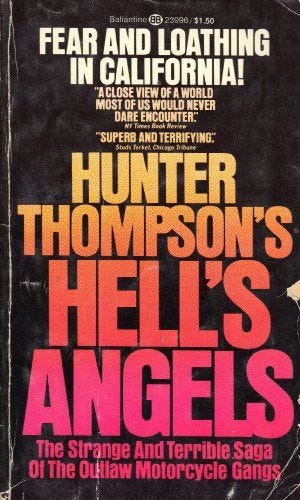Bite-Sized Book Reviews: Abundance, Cryptonomicon and Hell's Angels
Because books move slower than newspapers in all the best ways
Reading has done wonders for my mental health to start the year. The more I see my friends drowning in the daily news barrage, the more I have been drawn to books that either contain an escape, a well-formulated thesis, or a deep dive into a subculture. It’s part of my own attempt to reclaim my attention from sources that only wish to commoditize it.
To encourage this process more, I’d like to share a bit about what I’ve been reading. Got a book recommendation? I’d love to hear it.
Abundance: A hopeful vision marred by myopia
I typically try to avoid political books that I have a likelihood to agree with based on the synopsis. However, I let my echo chamber aversion go for this one, as I think both Derek Thompson and Ezra Klein have a rare status among liberals. I anticipate this book to be picked up by political leaders and that makes it worth following.
Their thesis is pretty simple. Leaders on the left have increasingly become the defenders of inefficiency and anonymous bureaucracy. Klein and Thompson argue that government should be enabled to do more, eventually helping them fight the powers of big business and conservatism. Through numerous examples, they advocate for a government that builds, and a politics based on abundance rather than scarcity. They accomplish this well enough in chapters that probably started out as essays.
What I found lacking was the authors’ ability to tell a complete picture of how things got this bad. They tackled the way democrats added red tape over time, but neglected to tackle how (and why) conservatives did the same. They avoided diving into topics such as lobbying and regulatory capture, which has done more to stifle innovation than zoning reform ever has. They picked convenient enemies, like those to the left of them, rather than address culprits such as local governments, public unions and non-profits who often stoke to the problems they want to address.
As a book designed to reorganize the left, I think it fails to unify a group that is in desperate need of unification. It still offers a better vision than anything I’ve seen from democrats in the last decade, and for that I say it’s worth the read.
They receive bonus points for citing Gary Gerstle’s Rise and Fall of the Neoliberal Order: America and the World in the Free Market Era, a book I thoroughly enjoyed in 2023!
Cryptonomicon: A complex, chaotic romp for the increasingly rare technology fan
I don’t know many people who I can recommend this book to. Every technology person seems to be either reading non-fiction as part of an efficiency-fueled frenzy, or they’re instead reading ChatGPT summaries of every piece of literature that they hear about at parties. Conversely, traditional fiction people seem to be increasingly anti-technology, favoring dystopian writings and certainly avoiding anything with the word crypto in it.
Luckily for them, this book is primarily about information warfare and cryptography rather than it is about cryptocurrency. Released in 1999, the story follows a cast of characters in two periods: World War II and modern day. Codebreakers such as the great Alan Turing make an appearance, as we learn a bit more about about the types of people that helped the allies gain information supremacy over the axis powers.
It is decidedly pro-technology, loosely tracking the invention of the computer and the Internet innovators who got us to where we are today. That said, it can feel like a bit of a “bro” story. I believe it failed the Bechdel test, but perhaps it can be forgiven due to the nature of it following codebreakers, hackers and soldiers in the pre-2000s technology scene.
Despite the computer references sounding dated in 2025, I think this story largely holds up. It effectively set the foundation for what computers would become, and what they would be used for. It tackled big ideas around privacy, freedom and information asymmetry. It also featured a few characters and lines of dialogue that I will remember for quite some time. I found it to be an enjoyable read. It would make a good movie, if not for the time jumps. I will be checking out more of Stephenson’s work.
Hell’s Angels: An action-packed reminder of how perception creates reality
Hunter S. Thompson is incapable of being boring. This book was certainly filled with memorable stories from his time embedded with the Hell’s Angels. What I didn’t expect was its admirable take-down of celebrity culture, journalism and government overreach. Although the peak of motorcycle club culture is behind us, I think these outlaws represented something that will never go away in America. For that, this was a fun and insightful read.
Freedom can be taken to extremes, and we will always have a fringe that lives an existence much wilder than we can handle. But Americans love their outlaws. It is what separates us from the Old World, for better or for worse. We envy those free enough to drift from town to town, even if they have to cheat and steal to pay for gas money.
Thompson effectively built up these bikers and tore them down in equal measure. He highlighted their unique spirit, community and isolation from society. He also wrote deeply about where our collective imaginations ran wild about the Hell’s Angels. Something that we still do today in our newspapers and social media feeds about other groups. I found it an enjoyable walk down memory lane, even though a few chapters contained the darkest and most depressing pages I’ve read this year.



